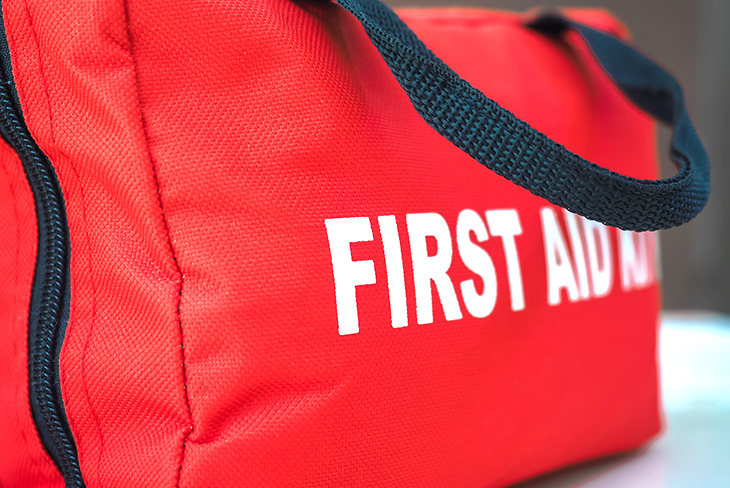What to do in a medical crisis

Do you know what to do in case of an emergency? Critical-care Paramedic Warren Hastings of Life Fourways Hospital offers the first steps for first aid in five medical emergencies while you wait for EMS to arrive.
Chest pain
Physical signs that someone may be having a heart attack include:
- Sudden pain or discomfort in the centre of the chest or other areas of the upper body (neck, jaw, arms) lasting more than a few minutes
- Shortness of breath
- Cold sweat
- Nausea
- Vomiting
- Light-headedness
- May appear ashen-grey in colour
- May complain of a feeling of impending doom (feeling of dying)
Call emergency medical services (EMS) immediately and sit the person up in a comfortable position. If unresponsive or showing irregular breathing, lay them on their side, protect the airway and keep them safe while waiting for EMS to arrive.
Choking
If left untreated, a foreign object in the airway can have serious consequences. If you come across someone who is choking, remain calm and call EMS. First, confirm that the person is choking by asking, ‘Are you choking?’. Then encourage them to cough, breathe or talk. If this doesn’t help, tell them you’re going to attempt to dislodge the object. Next:
- Stand or kneel behind them.
- Put your arms around the person’s trunk, under their arms.
- Make a fist with one hand and cover it with your other hand.
- Position your covered fist midway between their belly button and bottom end of their breastbone.
- Then perform abdominal thrusts (a quick, tight squeezing motion) with your arms around the person and your covered fist moving in an upward and inward motion. (Pregnant and obese people should be given chest thrusts.)
- Keep performing abdominal thrusts until the object is dislodged or the person becomes unconscious.
- In the event that the object dislodges, take the person to a hospital for further assessment.
Bleeding
Call EMS immediately if severe bleeding occurs due to an injury, then ensure your own safety and protection by wearing surgical gloves. Calm and reassure the affected person at all times. Use gauze or a clean cloth to apply pressure directly to the wound to stop blood flow and allow clots to form. When bleeding is under control, keep pressure on the wound with dressings and bandages. Severe bleeding must be dealt with quickly to prevent further blood loss and shock. For minor bleeding, keep the person reassured and calm.
Fainting
If someone faints or collapses in front of you and it’s safe for you to assist, lay them down to avoid unnecessary harm. Put them on their side to ensure an open airway and call EMS. Ensure that there are no harmful objects around them. Should they regain consciousness, assure them that help is on the way, and that they should remain lying on their side. Get as much information about them from family and bystanders that you can pass on to paramedics when they arrive to assist with treatment and reversing the potential causes.
Seizure
Seizures may vary from person to person. Call EMS immediately and then proceed with assisting the affected person, positioning them on the floor and on their side. Make sure you are wearing gloves so you do not come in contact with the person’s bodily fluids. Do not restrain them, but remove any objects that could cause further harm. Do not place anything in the mouth – tongue‑biting and bleeding from the mouth can be normal side effects. The person may be unconscious, confused or lethargic afterwards: place them on their side and reassure them until help arrives.
When calling emergency medical services…
- Keep your EMS number in an easy-to-find place and on your phone.
- Once connected, state your name and the number you’re calling from.
- Describe the emergency.
- Provide as much information about the location – physical address, landmarks etc.
- Stay on the line with the call taker – they can assist while you wait for EMS to arrive.
Emergency units are located at 41 Life Healthcare hospitals and they offer 24-hour emergency care, 7 days a week. Life Healthcare’s emergency medical service also employs paramedics in fully equipped response cars at seven of the units and offers free paramedic and advanced life support assistance to their immediate communities. For assistance, call 0860 123 367 and one of the response cars from the closest unit (see units listed below) will be dispatched to you. There is only a cost if an ambulance is dispatched.
Hospitals with response cars:
- Life The Glynnwood
- Life Springs Parkland Hospital
- Life Flora Hospital
- Life Fourways Hospital
- Life Rosepark Hospital
- Life Vincent Pallotti Hospital
- Life Kingsbury Hospital
The information is shared on condition that readers will make their own determination, including seeking advice from a healthcare professional. E&OE. Life Healthcare Group Ltd does not accept any responsibility for any loss or damage suffered by the reader as a result of the information provided.

